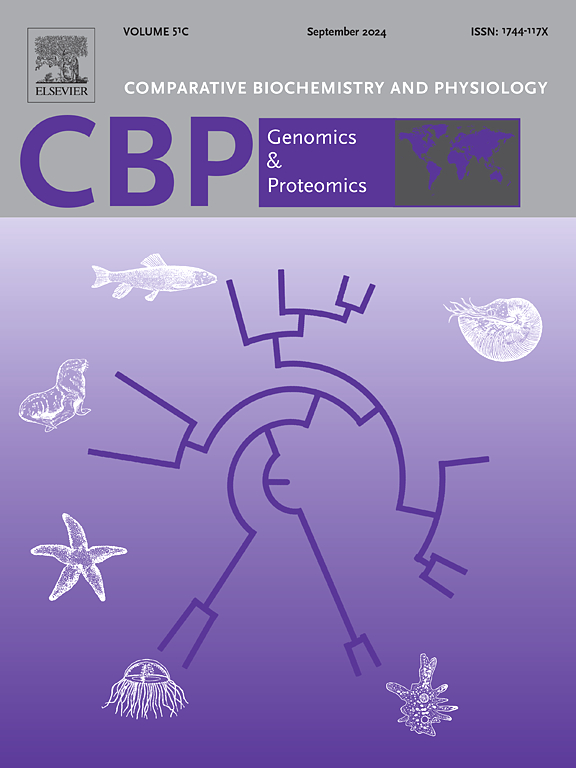慢性高温应激对fuscus claras肌肉组织完整性及代谢相关基因的影响
IF 2.2
2区 生物学
Q4 BIOCHEMISTRY & MOLECULAR BIOLOGY
Comparative Biochemistry and Physiology D-Genomics & Proteomics
Pub Date : 2025-03-27
DOI:10.1016/j.cbd.2025.101497
引用次数: 0
摘要
全球变暖导致的高温天气日益普遍,给水生生态系统和水产养殖实践带来了重大挑战。本研究探讨了慢性高温胁迫对原产于亚热带和热带地区的鲶鱼fuscus的影响。在高温条件下(高温,34℃)和常温条件下(高温,26℃)培养90天。通过组织学和转录组学分析来评估持续高温应激对肌肉组织的影响。组织学检查显示,HT组损伤明显,表现为组织排列不规则,肌纤维间隙扩大,肌丝断裂,肌核破裂。转录组学分析发现,高温胁迫下肌肉组织中有975个差异表达基因(deg),其中512个基因上调,463个基因下调。热休克蛋白(Hsp)家族基因,包括Hsp40、Hsp70和Hsp90,在热应激下显著上调。这些deg的富集分析揭示了蛋白质加工、PPAR信号通路以及内质网内脂肪酸氧化和代谢的显著变化。这些结果表明,在高温胁迫下,fuscus经历了大量的组织损伤和代谢反应降低。本研究为进一步研究鱼类对温度波动的适应性提供了科学依据。本文章由计算机程序翻译,如有差异,请以英文原文为准。

Effects of chronic high-temperature stress on muscle tissue integrity and metabolism-related genes in Clarias fuscus
The increasing prevalence of high-temperature days due to global warming presents significant challenges for aquatic ecosystems and aquaculture practices. This study investigates the effects of chronic high-temperature stress on Clarias fuscus, a catfish species native to subtropical and tropical regions. The fish were cultured for 90 days under high-temperature conditions (HT, 34 °C) and normal temperature conditions (CT, 26 °C). Histological and transcriptomic analyses were conducted to assess the impact of continuous high-temperature stress on muscle tissue. Histological examination revealed significant damage in the HT group, characterized by irregular tissue arrangement, widened muscle fiber gaps, broken muscle filaments, and cracked nuclei. Transcriptomic analysis identified 975 differentially expressed genes (DEGs) in muscle tissue under high-temperature stress, with 512 genes up-regulated and 463 down-regulated. Notably, heat shock protein (Hsp) family genes, including Hsp40, Hsp70 and Hsp90, were significantly up-regulated under heat stress. Enrichment analysis of these DEGs revealed significant alterations in protein processing, the PPAR signaling pathway, and fatty acid oxidation and metabolism within the endoplasmic reticulum. These findings suggest that C. fuscus experiences substantial tissue damage and a reduced metabolic response under high-temperature stress. This study provides a scientific foundation for future research on the adaptability of fish to temperature fluctuations.
求助全文
通过发布文献求助,成功后即可免费获取论文全文。
去求助
来源期刊
CiteScore
5.10
自引率
3.30%
发文量
69
审稿时长
33 days
期刊介绍:
Comparative Biochemistry & Physiology (CBP) publishes papers in comparative, environmental and evolutionary physiology.
Part D: Genomics and Proteomics (CBPD), focuses on “omics” approaches to physiology, including comparative and functional genomics, metagenomics, transcriptomics, proteomics, metabolomics, and lipidomics. Most studies employ “omics” and/or system biology to test specific hypotheses about molecular and biochemical mechanisms underlying physiological responses to the environment. We encourage papers that address fundamental questions in comparative physiology and biochemistry rather than studies with a focus that is purely technical, methodological or descriptive in nature.

 求助内容:
求助内容: 应助结果提醒方式:
应助结果提醒方式:


